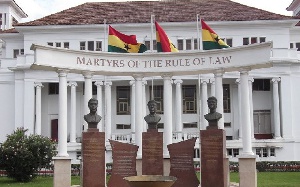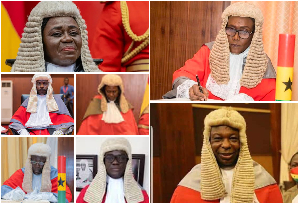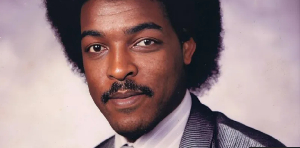Let us forget politics and the voter’s registration brouhaha. I have read the judgment of the case NDC v AG & EC by the Supreme Court and without emotions or logic, I agree with the legal reasoning given by the Supreme Court for not using the old voter’s card based on the legal arguments as given by the parties. Of course, the Court has no basis to go into the merits and demerits of the policy decision of the Electoral Commission (EC) in the exercise of their discretionary powers as long as it is in accordance with due process of the law and it is not arbitrary, capricious or biased as stated in Article 296 of the 1992 Constitution. It can be said that the Supreme Court has ruled and so be it; since litigation must come to an end, precedence has been set, so let us move on.
In my opinion, however, the aspect on the birth certificate looks like a “forced landing” and may not be a universal truth or prone to practical legal difficulties going forward. It looks like trying to find a reason for a conclusion already made on a particular issue but ended up making a very general statement that “…A birth certificate is not a form of identification. It does not establish the identity of the bearer. Nor does it link the holder with the information on the certificate. Quite obviously, (emphasis mine) it provides no evidence of citizenship….”. The Supreme Court may have to review this aspect of the ruling that seems to make very general and broad statements about birth certificates that cannot be universally proven going forward.
UNIVERSAL ACCEPTANCE OF BIRTH CERTIFICATE AS FORM OF IDENTIFICATION
From a few research work on the internet I found the following: Birth registration is required for a child to get a birth certificate – his or her first legal proof of identity (emphasis mine). It enables a child to receive medical treatment, go to school, inherit property, prevent child exploitation and find legal work. (UNICEF)
“..It’s a small paper but it actually establishes who you are and gives access to the rights and the privileges, and the obligations, of citizenship” (emphasis mine). (Archbishop Desmond Tutu, February 2005.)
“Registration of birth is the State’s first acknowledgement of a child’s existence. It represents recognition of a child’s significance to the country and of his or her status under the law. This ticket to citizenship (emphasis mine) opens the door to the fulfilment of rights and to the privileges and services that a nation offers its people”. Dow (1998: 5) In India, a birth Certificate is the most important identity document (emphasis mine) that makes it possible for anyone in possession of it to benefit from a gamut of services offered by the Indian Government to its citizens including the right to vote(emphasis mine).
In the United States, birth certificates serve as proof of an individual’s age, citizenship status, and identity. By itself, the birth certificate is usually only considered proof of citizenship but not proof of identity (emphasis mine), since it is issued without a photograph at birth, containing no identifying features. A birth certificate is normally produced along with proof of identity, such as a driver’s license or the testimony of a third party (such as a parent), to establish identity.
In my opinion, with respect to identification, how does one prove his age? The simply answer is by using one’s Birth certificate. How does a minor identify himself to open a bank account? The answer to this question is also through the use of a Birth certificate. How does a parent identify a child to receive healthcare? By using a Birth certificate. How does one who wants a driving license identify himself as having attained the age of majority?
Also, it is by the use of a Birth certificate. How does one identify himself as a citizen to obtain a passport for the first time? Through the use of a Birth certificate. How does a parent identify a child to start school? By the use of a Birth certificate.
THE SUPREME COURT REASONING ON BIRTH CERTIFICATE
I quote: “A birth certificate is not a form of identification. It does not establish the identity of the bearer. Nor does it link the holder with the information on the certificate. Quite obviously, it provides no evidence of citizenship.” Unquote.
My comment on the above statement are as follows:
Where is the “obviousness”? The birth certificate has the name of the child and nationality of both parents which is validated at the time of registration of the birth or should be validated. If both or even one is Ghanaian, where is the “obviousness” that the child is not a Ghanaian? This is even not my primary concern. Why and how is a birth certificate not a form of identification? It has the name of the child and who the parents are and whether or not the parents are Ghanaians? So how can a newly born child be identified? Also are we saying it does not establish the identity of the child? What will constitute the identity of the child then? A small question on the Ghana card. Since it is only issued when you are 15 years and above, when does one become a citizen of Ghana? And how do you prove you are a citizen when below 15 years?
I quote “It therefore does not satisfy the requirements of article 42 of the Constitution. In fact, as a form of identification, it is worse than the NHI Card which was held to be unconstitutional as evidence of identification of a person who applies for registration as a voter in Abu Ramadan (No 1) and Abu Ramadan (No 2). It is little wonder that a birth certificate has never been included as one of the documents to be used as evidence of identification by a person who applies to be registered as a voter”. Unquote.
My comment on the above statement are as follows:
It is okay if the birth certificate does not satisfy the requirement of Article 42 of the Constitution since the Supreme Court is the custodian of the Constitution. They have spoken but how does it make it worse than the NHI card? We could have done without the statement that it is “…worse than the NHI card…”. I can sense emotion here or even if it is an obiter, from a Supreme Court it should not be taken lightly. If this was said by the legal counsel of the EC it could be understandable. The Attorney General cannot even be pardoned to make such statement. Again, the statement that “It is little wonder that a birth certificate has never been included as one of the documents to be used as evidence of identification by a person who applies to be registered as a voter” sounds like what must be part of the pleadings of the EC. I again sense an obiter which must not be taken lightly.
Granted the birth certificate is not proof of citizenship and of course only citizens can vote. Now I get two guarantors who have been registered to vote and I get registered as well and now have a valid voters ID. Does the voters ID now confirm me as a citizen, since only citizens can vote and I have been registered to vote? Is the voters ID now a better proof of my citizenship than my birth certificate?
CONCLUSION
Ghana is of course a sovereign country and we can decide what our law is but there are certain universally acceptable norms we must adhere to since we do not exist in a vacuum. Even in the USA where the birth certificate is not a form of identification because it has no picture, it is however a proof of citizenship. For us in Ghana we are saying it is neither a form of identification nor proof of citizenship. Will it stand the test of time?
Okay if it is just a record of birth on a piece of paper, what benefit is it to nudge us to register our births since not registering would not have any adverse effect on the parent.
By trying to justify a particular ruling we may end up creating multiple legal problems going forward. The legal reasoning on the birth certificate as it stands now is too broad and needs to be narrowed down to only voter registration and not that it is not a form of identification and does not establish the identity of the bearer. This is not universally true. We can say Ghana’s birth certificate……..not a birth certificate, then we know that is our law set by the Supreme Court and notify the world.
By the way, what is the position on the death certificate?
Opinions of Monday, 27 July 2020
Columnist: Dr. Kofi Anokye Owusu-Darko. LLB, LLM



















